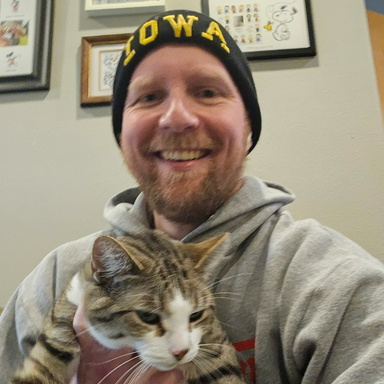Eddie Rosenquist, 39, first entered the University of Iowa Department of Psychiatry as a patient after being arrested for an OWI in 2019.
He’d drank plenty in high school and college but successfully quit alcohol when his daughter Claire was born in his early twenties. As he grew dissatisfied with his teaching job during his early thirties, however, he found himself returning to the bottle.
“I just wasn’t liking my job as much, and I couldn’t vocalize that or deal with it in a healthy manner,” he said.
After a substance abuse evaluation, he began working his way through residential and intensive outpatient treatment, eventually finding his way to the addiction recovery support group at the UI Partial Hospitalization Program.
The experience has “reset my thinking,” he said. “I really appreciate the people that work there.”

One of those people is Jeff Kranz. A social worker with nearly 40 years of mental health and addiction treatment experience, Kranz has been working with patients like Rosenquist in Partial Hospitalization for the last eight years.
“He’s wonderful,” Rosenquist said of Kranz, adding with an audible smile, “Even though he’s from Illinois.”
Kranz described his Iowa City-born patient in turn as “a cool guy” who takes the lessons of recovery seriously.
“We have a relationship-based program, and—Eddie would be one of them—the patients feel like we really care,” Kranz said. “We’re not just doing worksheets here. We’re getting into their world.”
The world of a person suffering from addiction, Kranz said, tends to be overshadowed by unresolved childhood traumas connected to fear, depression, and anxiety that alcohol and drugs are used to escape from in adulthood.
“Sometimes people come in, they’re trying to avoid dealing with their issues, and they’ve been doing that they’re whole life,” Kranz said. “And I understand that. But we’re talking about life or death here. People I’ve loved have died from this. I’m not here to coddle you. We mean business.”
Breaking the cycle of trauma and addiction requires honesty and connection, Kranz emphasized; lessons he said Rosenquist embraces by regularly attending weekly meetings of Alcoholics Anonymous in addition to the partial hospitalization’s own recovery support group.
“Patients make fun of me because we talk about being emotionally present,” Kranz said. “Not just with others, but with everything— our whole planet, animals…everything. And they really embrace that concept too. They recognize that’s an important thing to develop in their lives.”
Rosenquist had a relapse last year and is back in recovery, a trajectory that tracks with what the seasoned addiction-services provider sees everyday: Recovery, Kranz said, “isn’t very linear.”
“This stuff isn’t rocket science,” he said. “At the same time, it’s like climbing Mount Everest. I’m not saying by any means that it’s easy.”
For his part, Rosenquist is more than happy to talk honestly about where he’s at in his journey.
“I think my first arrest and first treatment, I was probably biding my time, getting done with the legal stuff, probably not ready to quit drinking,” he said, “This time I’m very content with not drinking.”
One of the changes he plans to make is to his career.
“I’m thinking about going into counseling,” he said.